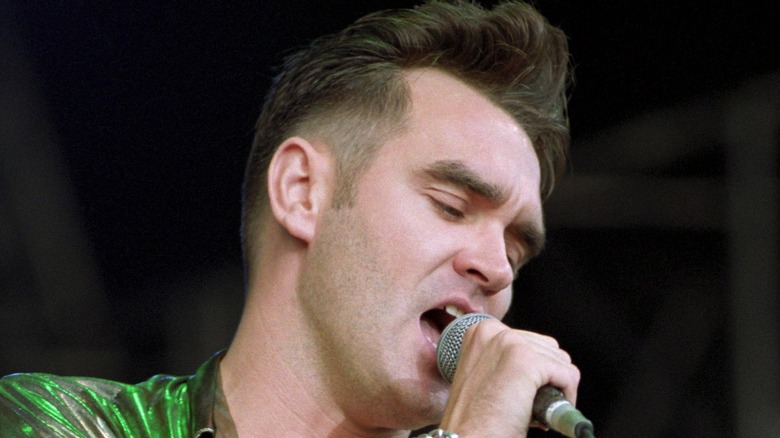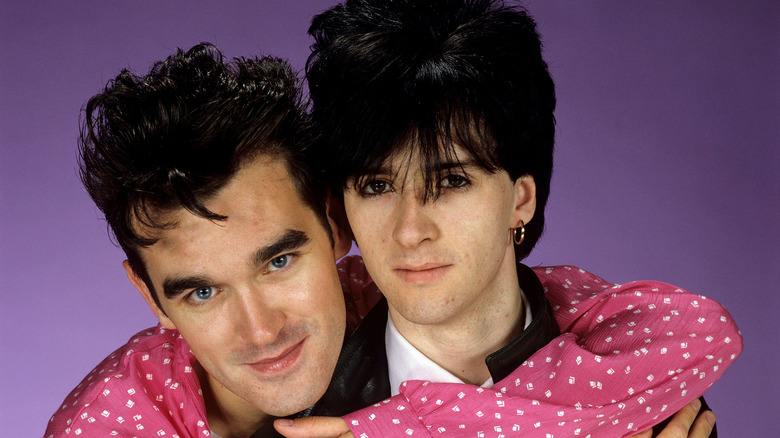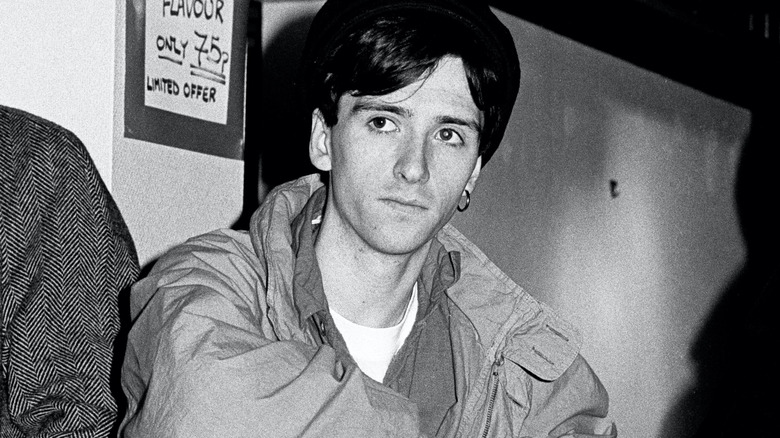The Real Reason The Smiths Broke Up
For a five-year period in the 1980s, the Smiths were among the linchpins of the British alternative/indie/post-punk scene, with many of their songs making up the soundtrack of many a brooding youth who grew up during that time. However, their impact on pop culture can still be felt to this day, as evidenced by how their music played a key part in the plot of "500 Days of Summer" and how the catchy coda of "Panic" inspired the title of a "Black Mirror" episode. Their lead singer, Morrissey (pictured above during one of his solo concerts in the early '90s), makes more headlines these days for his controversial views (as opposed to his songs), but when you get parodied by "The Simpsons" as he was in the Season 32 episode "Panic on the Streets of Springfield," it's a good sign that your music is still relevant several decades after the fact.
Alas, just like many other influential bands, the Smiths weren't long for the music world. As explained by The Guardian, the group disbanded late in 1987, shortly after releasing their final album, "Strangeways Here We Come." This came a few months after a confusing stretch in which reports erroneously claimed that guitarist Johnny Marr had left the band. With that in mind, it's also true that Marr eventually left ahead of the Smiths' dissolution, but what drove them to break up in the first place?
Johnny Marr and Morrissey 'just saw [their] futures differently'
In a 2018 interview with Rolling Stone, Johnny Marr was asked about his band's breakup, specifically the false reports on his departure from the Smiths. While discussing the topic, Marr was rather cagey, noting at first that he wouldn't want to write a book about the breakup even if many people would want to read such a title.
After mentioning that the miscommunication was indeed one of the driving forces behind his decision to quit the Smiths and their eventual disbandment, Marr suggested that his musical partnership with Morrissey had run its course at that time. "As a mature adult, that's the way I see things happen," he explained. "When things aren't meant to be, they just break down like cogs in a machine stop working. They stop being harmonious. It's the same in bands as it is in relationships, and as it is in jobs. It's facts of life, I think."
When Rolling Stone asked Marr whether clashing personalities were another factor behind the breakup, Marr answered in the affirmative, pointing out that having people with diverse temperaments could be beneficial to a band during the good times, but not when things aren't going too well. Offering his final thoughts on the topic, the guitarist told the publication that he and Morrissey "just saw our futures differently," adding that as far as his future was concerned, remaining in the Smiths was not a part of it.
Marr didn't want to manage a dying, 'unmanageable' band
While Johnny Marr's answers to the breakup questions in the Rolling Stone interview didn't contain too many specifics, he was more open on the subject while speaking to The Guardian two years prior. Asked whether it really was that stressful to read the reports claiming he quit the Smiths when he hadn't done so yet, Marr clarified that what really got to him was the insinuation that he would take over as the band's manager, given how he had unofficially served in such a capacity for most of their existence. "It's what split the band up. To this day I haven't met anyone who thinks a major rock group should be managed by the 23-year-old guitar player," he recalled. Marr also described the Smiths as having a reputation as an "unmanageable" group due to all the managers they had fired. "A lot of it was to do with control," the guitarist added.
With Marr unprepared to manage the Smiths at that point in their career and also feeling "forced out" of the band, he decided to make his departure official. And when he did, the group wished him luck, but not without cheekily adding that they were considering "other guitarists" to step into his role. "I literally thought it was a joke. It was the final nail in the coffin and it took me a long time to forgive them. It was pretty callous," Marr said, though he acknowledged that he no longer takes this against his former bandmates.


